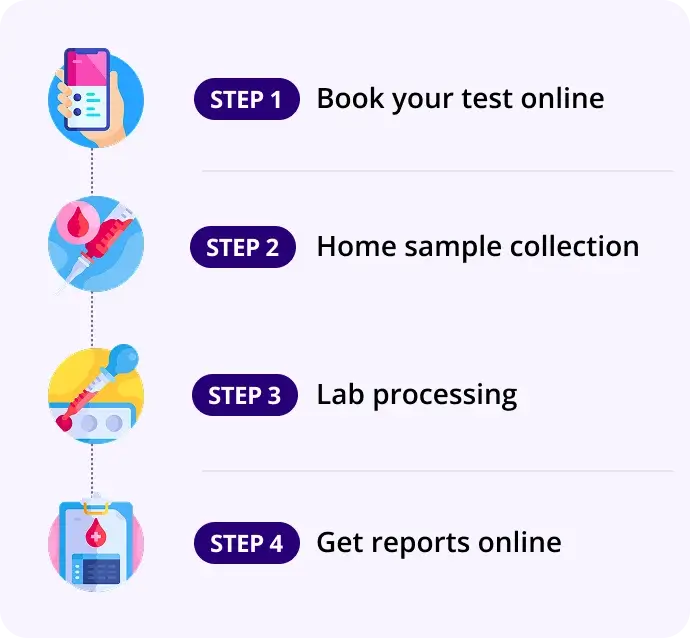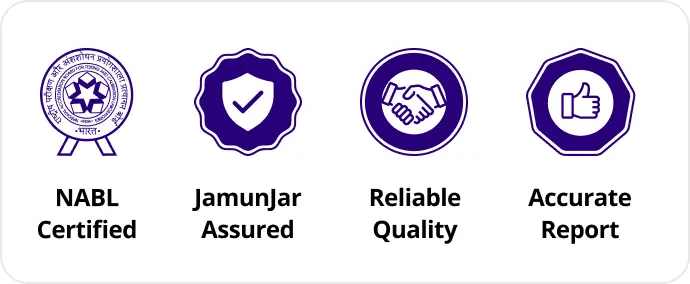Search for
Immunoglobulin G (IgG)
Blood
Report in 4Hrs
At Home
No Fasting Required
Details
Group of blood proteins involved in immune function
₹449₹1,100
59% OFF
FREE:
Ai Insights
Immunoglobulin G (IgG) - Comprehensive Medical Test Guide
- Why is it done?
- IgG is the most abundant antibody in the blood and measures the immune system's ability to produce specific antibodies against pathogens and antigens
- Detects past or present infections from bacteria, viruses, fungi, and parasites
- Assesses immune system function and protective immunity status
- Evaluates vaccine response and immunity to specific diseases (measles, mumps, rubella, varicella, hepatitis)
- Diagnoses immunodeficiency disorders and immune system dysfunction
- Investigates recurrent infections or suspected immune-related disorders
- Monitors patients with autoimmune diseases or those receiving immunosuppressive therapy
- Typically performed during initial immune evaluation, post-vaccination assessments, or when immune dysfunction is suspected
- Normal Range
- Reference Values (vary by laboratory): 700-1,800 mg/dL (or 7-18 g/L)
- Pediatric ranges: Vary by age group (newborns: 700-1,100 mg/dL; older children approach adult levels)
- Unit of Measurement: mg/dL or g/L (milligrams per deciliter or grams per liter)
- Normal Results: IgG levels within the reference range indicate adequate immune system function and sufficient protective antibodies
- High IgG Levels: >1,800 mg/dL may indicate chronic infection, autoimmune disease, multiple myeloma, or other immune disorders
- Low IgG Levels: <700 mg/dL suggests immunodeficiency, immune system dysfunction, or inadequate immune response
- Specific IgG Antibodies: Positive results confirm past infection or immunity to specific diseases; negative results indicate no immunity or never encountered the pathogen
- Interpretation
- Elevated Total IgG: May indicate chronic infections (tuberculosis, endocarditis), autoimmune conditions (systemic lupus erythematosus, rheumatoid arthritis), multiple myeloma, Waldenström macroglobulinemia, or liver cirrhosis
- Decreased Total IgG: Suggests primary or secondary immunodeficiency (X-linked agammaglobulinemia, common variable immunodeficiency, selective IgG deficiency), protein-losing conditions, or acquired immunosuppression
- Positive Specific IgG (e.g., IgG to Measles): Indicates past infection or successful vaccination; patient has developed immunity to that specific pathogen
- Negative Specific IgG: Suggests no immunity to the pathogen; patient either never had the infection/vaccination or immune response was inadequate
- Factors Affecting Results: Age (levels increase with age), race/ethnicity variations, chronic illnesses, medications (immunosuppressants, corticosteroids), pregnancy, spleen dysfunction, recent infections, vaccination status, genetic factors
- Clinical Significance of Patterns: Rising IgG over time may indicate acute infection; stable levels suggest chronic infection or established immunity; rapidly falling levels may indicate bone marrow failure or immune system deterioration
- IgG and IgM Combination: High IgM with high IgG may indicate acute infection; high IgG with negative IgM suggests past infection or vaccination
- Associated Organs
- Primary Organ Systems Involved: Lymphatic system (lymph nodes, bone marrow), immune system (B lymphocytes, plasma cells), spleen, liver
- Conditions Associated with Abnormal IgG Levels:
- Low IgG: X-linked agammaglobulinemia, common variable immunodeficiency (CVID), selective IgG deficiency, transient hypogammaglobulinemia of infancy, ataxia-telangiectasia, DiGeorge syndrome, protein-losing enteropathy, nephrotic syndrome
- High IgG: Multiple myeloma (IgG myeloma), Waldenström macroglobulinemia, systemic lupus erythematosus, rheumatoid arthritis, Sjögren syndrome, hepatitis C, HIV/AIDS, chronic infections (tuberculosis, endocarditis, syphilis), autoimmune hepatitis, primary biliary cirrhosis, cirrhosis
- Diseases Diagnosed or Monitored: Immune deficiencies, plasma cell dyscrasias, autoimmune disorders, chronic infections, lymphoproliferative malignancies
- Potential Complications Associated with Abnormal Results: Low IgG: Increased susceptibility to infections (bacterial, viral, parasitic), recurrent respiratory/gastrointestinal infections, sepsis, increased morbidity/mortality. High IgG: Tissue damage from immune complex deposition, hyperviscosity syndrome, thrombosis, organ dysfunction (kidneys, joints, skin)
- Affected Body Systems: Hematologic, respiratory, gastrointestinal, renal, musculoskeletal, integumentary, neurologic systems
- Follow-up Tests
- If Total IgG is Abnormal: Quantitative immunoglobulin panel (IgG, IgA, IgM, IgE, IgD), protein electrophoresis, immunoelectrophoresis, flow cytometry, complete blood count, liver function tests
- If Low IgG Suspected (Immunodeficiency): IgG subclass analysis, lymphocyte subset analysis (CD4, CD8 counts), flow cytometry, T-cell and B-cell function tests, genetic testing, bone marrow biopsy
- If High IgG Suspected (Myeloma/Autoimmune): Serum protein electrophoresis, immunofixation electrophoresis, free light chains, bone marrow biopsy, imaging studies (X-ray, CT, MRI), renal function tests, calcium levels
- Specific Pathogen-Related Follow-ups: If specific IgG positive (e.g., CMV, EBV, herpes simplex): IgM testing, viral cultures, nucleic acid testing, imaging based on clinical presentation
- Vaccine Response Evaluation: If vaccine-specific IgG negative after vaccination: Consider revaccination, evaluate immune status, assess for malabsorption, test other specific antibodies
- Monitoring Frequency: Immunodeficiency patients: Baseline, then every 6-12 months; Multiple myeloma: Every 1-3 months during treatment; Autoimmune diseases: Every 6-12 months or as clinically indicated
- Complementary Tests: Complement levels (C3, C4), antinuclear antibody (ANA), rheumatoid factor, anti-tissue transglutaminase, chest X-ray, blood cultures if infection suspected
- Fasting Required?
- Fasting Requirement: NO - Fasting is not required for IgG testing
- Patient Preparation: No special preparation needed; patient may eat, drink, and take medications normally before blood draw
- Sample Collection: Routine venipuncture (blood draw) from arm vein; no special collection containers required beyond standard serum separator tubes
- Timing Considerations: For vaccine response testing, wait at least 2-4 weeks after vaccination to allow adequate antibody production. For acute infection assessment, timing relative to illness onset may affect results
- Medications: No medications need to be withheld or avoided specifically for IgG testing; continue all regular medications as prescribed. Immunosuppressive drugs may affect results but should not be stopped without physician guidance
- Additional Instructions: Inform provider of recent infections, vaccinations, immunizations, or immunosuppressive therapy. If testing for specific IgG antibodies, provide medical history relevant to that antigen. Avoid collecting blood immediately after intense exercise or emotional stress if possible
How our test process works!

